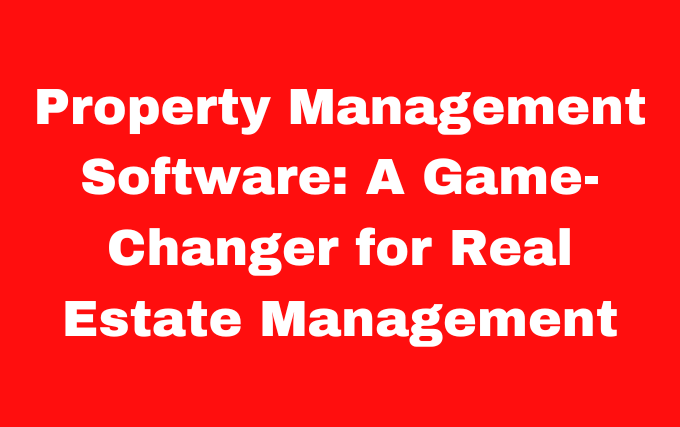In today’s fast-paced real estate industry, staying on top of operations, tenant relations, and financials can be a daunting task. Property management software has emerged as a powerful solution, transforming how landlords, property managers, and real estate professionals manage their assets. This technology streamlines daily operations, improves efficiency, and ensures a seamless experience for property owners and tenants alike.
What is Property Management Software?
Property management software (PMS) is a digital platform designed to assist in managing rental properties, commercial real estate, housing associations, and other property-related assets. It offers a comprehensive set of tools to automate essential tasks such as tenant screening, rent collection, maintenance management, accounting, and lease tracking. These platforms cater to both small-scale landlords and large real estate companies, providing customizable solutions based on their unique needs.
Key Features of Property Management Software
- Tenant and Lease Tracking: One of the primary functionalities of PMS is tenant and lease management. The software allows property managers to store tenant information, monitor lease agreements, and track rent payments. Automated reminders for lease renewals or overdue payments help reduce manual follow-ups and ensure smooth communication.
- Online Rent Collection: Handling rent payments manually can be time-consuming and prone to errors. Property management software simplifies this process by enabling tenants to pay rent online through secure portals. With automatic payment tracking, property managers can reduce late payments and maintain a clear financial record.
- Maintenance Management: Managing maintenance requests can become overwhelming without proper organization. Property management software provides an efficient way for tenants to submit repair requests, while property managers can track, assign, and resolve these issues in a timely manner. This creates a transparent communication channel between tenants and managers, improving tenant satisfaction.
- Accounting and Financial Reporting: Financial management is a critical aspect of property management. Many software solutions include accounting features that integrate directly with rent collection and expense tracking. Users can generate financial reports, track income and expenses, and even prepare tax documents, saving significant time and effort for property owners.
- Tenant Screening: A good property management software can assist in vetting prospective tenants by providing background checks, credit reports, and employment verifications. This feature helps landlords make informed decisions and minimize the risk of renting to problematic tenants.
- Document Management: Property management involves handling a large volume of paperwork, from lease agreements to maintenance records. The software helps digitalize this documentation, storing it securely in the cloud for easy access and retrieval. This reduces the hassle of physical storage and ensures that all important documents are organized and protected.
- Mobile Accessibility: Many modern property management platforms offer mobile apps, allowing users to manage their properties from anywhere. This feature is particularly beneficial for managers overseeing multiple properties, as it provides flexibility and real-time access to critical information.
Benefits of Using Property Management Software
- Time Efficiency: Automating repetitive tasks, such as rent collection, lease renewals, and tenant communication, significantly reduces the amount of manual work required. Property managers can focus on more strategic activities, like growing their portfolios and improving tenant relations.
- Improved Communication: Property management software facilitates transparent communication between tenants, landlords, and service providers. With features like automated reminders, instant notifications, and centralized messaging, misunderstandings or delays are minimized, creating a smoother management experience.
- Cost-Effective: Although there is an upfront cost associated with purchasing or subscribing to a property management platform, the long-term savings are substantial. By reducing errors, streamlining processes, and cutting down on administrative overhead, property owners can save money while maintaining a high level of service.
- Data-Driven Decisions: The reporting tools within property management software give landlords access to detailed insights into their properties’ performance. With real-time data on rent collections, vacancy rates, and maintenance costs, managers can make more informed decisions, optimize operations, and boost profitability.
- Scalability: Property management software grows with your business. Whether you’re managing a few units or a large portfolio of properties, these platforms can scale accordingly. They provide customizable features that adapt to the changing needs of your business.
How to Choose the Right Property Management Software
Selecting the right property management software depends on several factors:
- Portfolio Size: If you’re managing a small number of units, a simple, easy-to-use platform might be ideal. For larger portfolios, you’ll need more robust features, such as advanced reporting and multi-property management.
- Budget: Software solutions vary widely in price. It’s essential to consider both the upfront cost and any recurring subscription fees. Many platforms offer tiered pricing plans based on the size of your portfolio or the features you need.
- User Experience: The interface should be intuitive and easy to navigate. A good property management platform simplifies tasks rather than complicating them, so ease of use is a critical factor.
- Customer Support: Strong customer support is vital, especially if you’re new to property management software. Look for vendors who offer training, resources, and ongoing support to help you get the most out of the system.
- Integration Capabilities: If you’re using other software for accounting or marketing, ensure that your property management software integrates seamlessly with those tools. This will prevent data silos and enhance overall efficiency.
The Future of Property Management Software
As technology continues to advance, property management software will become even more sophisticated. Future trends include the integration of artificial intelligence (AI) and machine learning, which could automate more complex tasks, such as predicting maintenance needs or analyzing market trends. Additionally, the use of blockchain technology for smart contracts and secure payments may further revolutionize the property management landscape.
With the rise of remote work and digitalization, more property managers and landlords are turning to property management software as a way to stay competitive and enhance their operational efficiency. The shift toward cloud-based, mobile-accessible platforms signals that property management software is not just a trend but an essential tool for the future of real estate management.
Conclusion
Property management software has become an indispensable tool for property managers, landlords, and real estate professionals. By automating administrative tasks, improving communication, and providing data-driven insights, these platforms help maximize profitability and enhance the tenant experience. As the real estate industry continues to evolve, property management software will play a critical role in shaping its future.
Whether you’re a small landlord or managing a large real estate portfolio, investing in the right property management software can make a world of difference in your operations.








